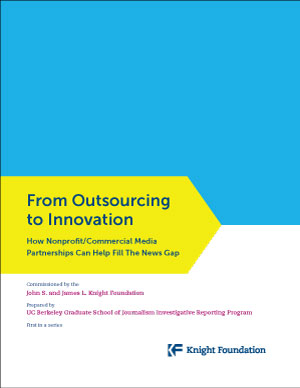
White Paper: Nonprofit/Commercial Media Partnerships Fill News Gap
[Source: John S. and James L. Knight Foundation, March 6, 2012]
 New research reveals media hybrids can enhance investigative reporting
New research reveals media hybrids can enhance investigative reportingA new report from the UC Berkeley Graduate School of Journalism’s Investigative Reporting Program (PDF) explores how partnerships between commercial media and nonprofit journalism can reach a broader audience and have a stronger impact. The report reveals how these new joint ventures can sustain a nonprofit media organization’s bottom line. In an era of newsroom cutbacks and a decline in local news, cross-platform media partnerships offer hope for a beleaguered industry.
The report, “From Outsourcing to Innovation,” lays out practical recommendations for a robust partnership between nonprofits and commercial outlets. At the same time, the report highlights a role for government and the technology sector in supporting these collaborations. Finally, it examines how market forces can help or hinder nonprofit/for-profit initiatives.
“Collaboration is likely to be the only way for reliable investigative reporting to not only survive but thrive given the economics of the media today,” said Lowell Bergman, a professor at the UC Berkeley Graduate School of Journalism.
The study by the UC Berkeley Graduate School of Journalism’s Investigative Reporting Program is one of 11 being conducted at leading universities in an effort to take action on the Federal Communications Commission’s June 2011 report, “Information Needs of Communities: The Changing Media Landscape in a Broadband Age,” the most comprehensive look at media policy in a generation. The John S. and James L. Knight Foundation and the Carnegie Corporation of New York are dedicating more than $800,000 to help implement the report’s recommendations, including projects which examine how tax law is affecting nonprofit media, how to create a plan for state-specific C-Spans and how to develop reliable metrics on media philanthropy. The study of media partnerships by UC Berkeley was subsidized by a $20,000 grant from these institutions.
“The FCC’s study will be either a catalyst for improving the flow of news and information in communities, or a book that sits on a shelf,” said Eric Newton, senior adviser to the president at Knight Foundation. “We hope America’s journalism schools will lead the debate on the report’s recommendations and the news community will make its views known. That's a good first step in the right direction.”
Prof. Bergman hosted a roundtable discussion of nonprofit and for-profit media leaders at UC Berkeley last November that helped inform the report, which addresses one of several recommendations laid out in the FCC’s “Information Needs of Communities”. That study showed that local communities were often under-served by the media and suggested ways to address the shortcomings.
UC Berkeley is among 12 universities convened by the Carnegie Corporation and the Knight Foundation over the past six years to improve journalism education and raise the profile and contribution of journalism school deans, directors and students in the ongoing public debate over the future of journalism.


